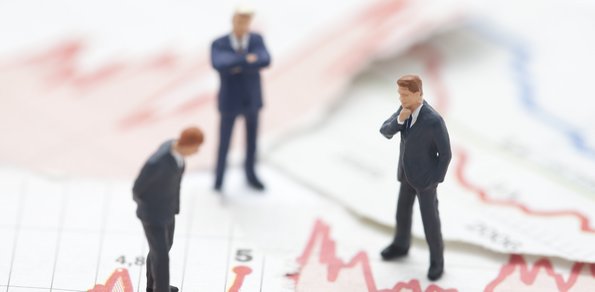Many of the capital increasing proposals put forward by as many as thirty European banks may be rejected as not sufficiently credible. Banks were instructed to devise plans to increase their capital cushions (reserves) in December after the European Banking Authority discovered in December 2001 they collectively need to raise circa €115bn in order to meet regulatory targets.
The EBA board are due to discuss the submitted plans at various meetings next week. Commerzbank was highlighted as one bank which needed to fill its capital shortfall. Since December the German bank has generated circa €3bn of capital toward its €5.3bn ‘stress test’ shortfall. Spanish bank Santander had the largest shortfall – of €15bn – but insists it has found ways of filling the gap. Italy’s Unicredit opted for a rights issue to raise capital.
Shares in Commerzbank AG, Germany’s second-largest lender, actually rose by fifteen percent on and around Jan. 19 after the bank reported it was halfway towards reaching its goal without resorting to government aid. Spanish lenders must raise 26.2 billion euros in core Tier 1 capital, the EBA said in December, more than any other European country.
Regulators will meet this week at the European Banking Authority in London to review the capital rules issued in December. Supervisors will likely discuss the sovereign buffer. The EBA told banks to raise 115 billion euros in fresh capital by the end of June as part of measures introduced to respond to the euro area’s fiscal crisis. The EBA requires banks to keep a core Tier 1 capital ratio of nine percent and hold additional reserves versus the debt of weaker Eurozone countries in relation to the market price of the bonds – the sovereign buffer.
Any decision to alter the sovereign buffer would be taken in conjunction with the European Systemic Risk Board, a group of European central bankers responsible for monitoring risk, one of the people said.
Greece Deadline Approaches
Greek Prime Minister Lucas Papademos has apparently struck a tentative deal with political parties on the austerity measures demanded by international creditors as European leaders maintained pressure to complete terms for a 130 billion-euro rescue package. The leaders are due to meet at midday to work on details after setting a framework for bank recapitalization, ensuring the viability of pension funds and creating measures to reduce wage and non-wage costs.
Euro-area finance chiefs told Greek Finance Minister Evangelos Venizelos on Feb. 4th that an increase in the bailout package wasn’t forthcoming, underscoring their frustration at a lack of progress on fixing the economy. Agreement on a new plan, which includes a write-down of Greek debt held by private creditors, has been hampered by insistence on the part of the EU and IMF on structural reforms that will underpin a return to competitiveness for the Greek economy as well as new fiscal measures for this year.
The rescue/swap includes a loss of more than 70 percent for bondholders in a voluntary debt exchange and loans that will need to exceed the 130 billion euros now on the table. A formal offer for the debt swap must be made by Feb. 13 in order to allow all procedures to be completed before the March 20 bond is due for payment.
Greece has fallen behind the initial budget targets set when it won a taxpayer-funded rescue of 110 billion euros in May 2010, which has now prompted threats to cut off aid hastening a German push to make bondholders contribute. The country’s economy shrank 6 percent last year, according to recent IMF estimates, the budget deficit is still close to 10 percent of GDP and unemployment is circa twenty three percent.
Even after a rescue Greece may still be saddled with too much debt, too little growth prospects and too large a budget deficit requiring more rescue funds, which euro nations (led by Germany) are increasingly reluctant to offer. Creditors are prepared to accept an average coupon (interest rate) as low as 3.6 percent on new 30-year bonds in the exchange, said a person familiar with the talks, who declined to be identified because a final deal hasn’t been struck yet.
Market Overview
European equities fell for the first time in five days in the morning session and the euro weakened before the deadline for Greece to reach a deal with its creditors. The Stoxx Europe 600 Index lost 0.3 as of 8:27 a.m. in London. Standard & Poor’s 500 Index futures slid 0.4 percent, while the MSCI Asia Pacific Index added 0.5 percent. The euro retreated 0.6 percent against the U.S. currency and the Australian and New Zealand dollars fell. Oil lost 0.8 percent, while gold rose 0.2 percent, rebounding from the biggest slump in five weeks on Feb. 3.
Asian stocks shed their initial gains after the International Monetary Fund said China’s economic expansion would be cut in half if Europe’s debt crisis worsens. That scenario would require “significant” fiscal stimulus from the nation’s government. The Shanghai Composite Index was little changed.
Australia’s dollar weakened 0.6 percent to $1.0713 after a government report showed retail spending unexpectedly declined, adding to the case for the Reserve Bank to lower interest rates when it meets tomorrow. New Zealand’s dollar fell 0.8 percent to 83.03 cents.
Market snapshot at 10:15 am GMT (UK time)
Asia Pacific markets experienced mixed fortunes in the early morning session, the Nikkei 225 closed up 1.10%, the Hang Seng closed down 0.23% and the CSI closed down 0.07%. The ASX 200 closed up 1.05%. European bourse indices have fallen sharply in the morning session due to the prevalent overhang of questions on the Greek crisis and Euro bank capitalisation stalking the market. The STOXX 50 is down 0.95%, the FTSE is down 0.46%, the CAC is down 1.20% and the DAX down 0.60%. The SPX equity index future is currently down 0.6%. ICE Brent crude is down $0.83 per barrel whilst Comex gold is down $19.30 an ounce.





